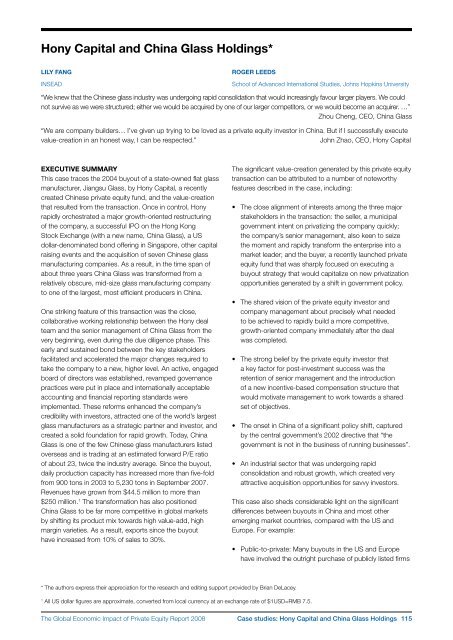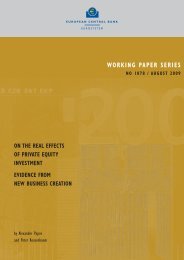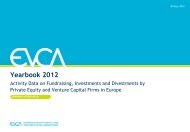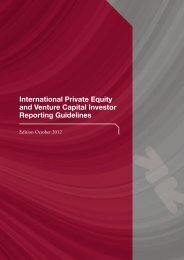Executive Summary: 3i Group plc and Little SheepIn 2006, a large, well‐established global private equity firminvested in a rapidly growing Chinese restaurant chain thatoriginated in Inner Mongolia. This case describes why andhow a productive, though unlikely, relationship was forgedbetween these two firms, and the result <strong>of</strong> their collaboration.3i, a highly respected global private equity firm, firstestablished a presence in Asia in 2001. Three years later,the firm became aware <strong>of</strong> a rapidly growing restaurant chaincalled Little Sheep. Due to its meteoric growth and nationalbrand name recognition, the founder <strong>of</strong> Little Sheep hadbeen approached by prestigious investors with attractive<strong>of</strong>fers <strong>of</strong> financing. As the founder later explained, hefavoured 3i over other prospective investors because <strong>of</strong> astrong belief that 3i had the expertise and commitment toadd value on a number <strong>of</strong> fronts, from corporate governanceto helping revamp the firm’s franchising strategy.Executive Summary: Hony Capital and China Glass HoldingsThis case traces the 2004 buyout <strong>of</strong> a state‐owned flat glassmanufacturer, Jiangsu Glass, by Hony Capital, a recentlycreated Chinese private equity fund, and the value creationthat resulted from the transaction. Once in control, Honyrapidly orchestrated a major growth‐oriented restructuring<strong>of</strong> the company, a successful IPO on the Hong Kong StockExchange (with a new name, China Glass), and the acquisition<strong>of</strong> seven Chinese glass manufacturing companies. As a result,in the time span <strong>of</strong> about three years China Glass wastransformed from a relatively obscure, mid‐size glassmanufacturing company to one <strong>of</strong> the largest, most efficientproducers in China.A striking feature <strong>of</strong> this transaction was the close,collaborative working relationship between the Hony dealteam and the senior management <strong>of</strong> China Glass from thevery beginning, even during the due diligence phase. Thisearly and sustained bond between the key stakeholdersfacilitated and accelerated the major changes required totake the company to a new, higher level. An active, engagedboard <strong>of</strong> directors was established, revamped governancepractices were put in place and internationally acceptableaccounting and financial reporting standards wereimplemented. <strong>The</strong>se reforms enhanced the company’scredibility with investors, attracted one <strong>of</strong> the world’s largestglass manufacturers as a strategic partner and investor, andcreated a solid foundation for rapid growth. Today, ChinaGlass is one <strong>of</strong> the few Chinese glass manufacturers listedoverseas and is trading at an estimated forward P/E ratio <strong>of</strong>about 23, twice the industry average. Since the buyout, dailyproduction capacity has increased more than five‐fold from900 tons in 2003 to 5,230 tons in September 2007.Revenues have grown from $44.5 million to more than$250 million. 2 <strong>The</strong> transformation has also positioned ChinaGlass to be more competitive in global markets by shifting itsproduct mix towards high value‐add, high margin varieties.2All US dollar figures are approximate, converted from local currency at an exchange rate <strong>of</strong> $1USD = RMB 7.5.114 Case studies: Chinese private equity cases: introduction<strong>The</strong> <strong>Global</strong> <strong>Economic</strong> <strong>Impact</strong> <strong>of</strong> <strong>Private</strong> <strong>Equity</strong> <strong>Report</strong> <strong>2008</strong>
Hony Capital and China Glass Holdings*Lily FanginseadRoger LeedsSchool <strong>of</strong> Advanced International Studies, Johns Hopkins University“We knew that the Chinese glass industry was undergoing rapid consolidation that would increasingly favour larger players. We couldnot survive as we were structured; either we would be acquired by one <strong>of</strong> our larger competitors, or we would become an acquirer. …”Zhou Cheng, CEO, China Glass“We are company builders… I’ve given up trying to be loved as a private equity investor in China. But if I successfully executevalue-creation in an honest way, I can be respected.”John Zhao, CEO, Hony CapitalExecutive SummaryThis case traces the 2004 buyout <strong>of</strong> a state‐owned flat glassmanufacturer, Jiangsu Glass, by Hony Capital, a recentlycreated Chinese private equity fund, and the value-creationthat resulted from the transaction. Once in control, Honyrapidly orchestrated a major growth‐oriented restructuring<strong>of</strong> the company, a successful IPO on the Hong KongStock Exchange (with a new name, China Glass), a USdollar‐denominated bond <strong>of</strong>fering in Singapore, other capitalraising events and the acquisition <strong>of</strong> seven Chinese glassmanufacturing companies. As a result, in the time span <strong>of</strong>about three years China Glass was transformed from arelatively obscure, mid‐size glass manufacturing companyto one <strong>of</strong> the largest, most efficient producers in China.One striking feature <strong>of</strong> this transaction was the close,collaborative working relationship between the Hony dealteam and the senior management <strong>of</strong> China Glass from thevery beginning, even during the due diligence phase. Thisearly and sustained bond between the key stakeholdersfacilitated and accelerated the major changes required totake the company to a new, higher level. An active, engagedboard <strong>of</strong> directors was established, revamped governancepractices were put in place and internationally acceptableaccounting and financial reporting standards wereimplemented. <strong>The</strong>se reforms enhanced the company’scredibility with investors, attracted one <strong>of</strong> the world’s largestglass manufacturers as a strategic partner and investor, andcreated a solid foundation for rapid growth. Today, ChinaGlass is one <strong>of</strong> the few Chinese glass manufacturers listedoverseas and is trading at an estimated forward P/E ratio<strong>of</strong> about 23, twice the industry average. Since the buyout,daily production capacity has increased more than five‐foldfrom 900 tons in 2003 to 5,230 tons in September 2007.Revenues have grown from $44.5 million to more than$250 million. 1 <strong>The</strong> transformation has also positionedChina Glass to be far more competitive in global marketsby shifting its product mix towards high value‐add, highmargin varieties. As a result, exports since the buyouthave increased from 10% <strong>of</strong> sales to 30%.<strong>The</strong> significant value-creation generated by this private equitytransaction can be attributed to a number <strong>of</strong> noteworthyfeatures described in the case, including:• <strong>The</strong> close alignment <strong>of</strong> interests among the three majorstakeholders in the transaction: the seller, a municipalgovernment intent on privatizing the company quickly;the company’s senior management, also keen to seizethe moment and rapidly transform the enterprise into amarket leader; and the buyer, a recently launched privateequity fund that was sharply focused on executing abuyout strategy that would capitalize on new privatizationopportunities generated by a shift in government policy.• <strong>The</strong> shared vision <strong>of</strong> the private equity investor andcompany management about precisely what neededto be achieved to rapidly build a more competitive,growth‐oriented company immediately after the dealwas completed.• <strong>The</strong> strong belief by the private equity investor thata key factor for post‐investment success was theretention <strong>of</strong> senior management and the introduction<strong>of</strong> a new incentive‐based compensation structure thatwould motivate management to work towards a sharedset <strong>of</strong> objectives.• <strong>The</strong> onset in China <strong>of</strong> a significant policy shift, capturedby the central government’s 2002 directive that “thegovernment is not in the business <strong>of</strong> running businesses”.• An industrial sector that was undergoing rapidconsolidation and robust growth, which created veryattractive acquisition opportunities for savvy investors.This case also sheds considerable light on the significantdifferences between buyouts in China and most otheremerging market countries, compared with the US andEurope. For example:• Public‐to‐private: Many buyouts in the US and Europehave involved the outright purchase <strong>of</strong> publicly listed firms* <strong>The</strong> authors express their appreciation for the research and editing support provided by Brian DeLacey.1All US dollar figures are approximate, converted from local currency at an exchange rate <strong>of</strong> $1USD=RMB 7.5.<strong>The</strong> <strong>Global</strong> <strong>Economic</strong> <strong>Impact</strong> <strong>of</strong> <strong>Private</strong> <strong>Equity</strong> <strong>Report</strong> <strong>2008</strong> Case studies: Hony Capital and China Glass Holdings 115
- Page 2 and 3:
The Globalization of Alternative In
- Page 5:
ContributorsCo-editorsAnuradha Guru
- Page 9 and 10:
PrefaceKevin SteinbergChief Operati
- Page 11 and 12:
Letter on behalf of the Advisory Bo
- Page 13 and 14:
Executive summaryJosh lernerHarvard
- Page 15 and 16:
• Private equity-backed companies
- Page 17 and 18:
C. Indian casesThe two India cases,
- Page 19 and 20:
Part 1Large-sample studiesThe Globa
- Page 21 and 22:
The new demography of private equit
- Page 23 and 24:
among US publicly traded firms, it
- Page 25 and 26:
should be fairly complete. While th
- Page 27 and 28:
according to Moody’s (Hamilton et
- Page 29 and 30:
draining public markets of firms. I
- Page 31 and 32:
FIguresFigure 1A: LBO transactions
- Page 33 and 34:
TablesTable 1: Capital IQ 1980s cov
- Page 35 and 36:
Table 2: Magnitude and growth of LB
- Page 37 and 38:
Table 4: Exits of individual LBO tr
- Page 39 and 40:
Table 6: Determinants of exit succe
- Page 41 and 42:
Table 7: Ultimate staying power of
- Page 43 and 44:
Appendix 1: Imputed enterprise valu
- Page 45 and 46:
Private equity and long-run investm
- Page 47 and 48:
alternative names associated with t
- Page 49 and 50:
4. Finally, we explore whether firm
- Page 51 and 52:
When we estimate these regressions,
- Page 53 and 54:
cutting back on the number of filin
- Page 55 and 56:
Table 1: Summary statisticsPanel D:
- Page 57 and 58:
Table 4: Relative citation intensit
- Page 59 and 60:
figuresFigure 1: Number of private
- Page 61 and 62:
Private equity and employment*steve
- Page 63 and 64:
Especially when taken together, our
- Page 65 and 66:
centred on the transaction year ide
- Page 67 and 68:
and Vartia 1985.) Aggregate employm
- Page 69 and 70:
sectors. In Retail Trade, the cumul
- Page 71 and 72:
employment-weighted acquisition rat
- Page 73 and 74:
FIguresFigure 1: Matches of private
- Page 75 and 76:
Figure 6:Figure 6A: Comparison of n
- Page 77 and 78:
Figure 8:Figure 8A: Comparison of j
- Page 79 and 80:
Figure 11: Variation in impact in e
- Page 81 and 82: Figure 12: Differences in impact on
- Page 83 and 84: Private equity and corporate govern
- Page 85 and 86: et al (2007) track the evolution of
- Page 87 and 88: groups aim to improve firm performa
- Page 89 and 90: distribution of the LBO sponsors, m
- Page 91 and 92: the most difficult cases. This stor
- Page 93 and 94: to see whether these changes of CEO
- Page 95 and 96: Figure 3:This figure represents the
- Page 97 and 98: TablesTable 1: Company size descrip
- Page 99 and 100: Table 5: Changes in the board size,
- Page 101 and 102: Table 7: Board turnoverPanel A: Siz
- Page 103 and 104: Part 2Case studiesThe Global Econom
- Page 105 and 106: European private equity cases: intr
- Page 107 and 108: Exhibit 1: Private equity fund size
- Page 109 and 110: Messer Griesheimann-kristin achleit
- Page 111 and 112: ealized it was not possible to grow
- Page 113 and 114: The deal with Allianz Capital partn
- Page 115 and 116: the deal, the private equity invest
- Page 117 and 118: Exhibit 1: The Messer Griesheim dea
- Page 119 and 120: Exhibit 5: Post buyout structureMes
- Page 121 and 122: New Lookann-kristin achleitnerTechn
- Page 123 and 124: feet. This restricted store space w
- Page 125 and 126: institutional investors why this in
- Page 127 and 128: Although a public listing did not a
- Page 129 and 130: Exhibit 5: Employment development a
- Page 131: Chinese private equity cases: intro
- Page 135 and 136: Hony’s Chinese name means ambitio
- Page 137 and 138: Establishing early agreement on pos
- Page 139 and 140: Executing the IPOEach of the initia
- Page 141 and 142: Exhibit 1A: Summary of Hony Capital
- Page 143 and 144: Exhibit 4: Members of the China Gla
- Page 145 and 146: Exhibit 6A: China Glass post‐acqu
- Page 147 and 148: Exhibit 8: China Glass stock price
- Page 149 and 150: 3i Group plc and Little Sheep*Lily
- Page 151 and 152: y an aggressive franchise strategy,
- Page 153 and 154: soul” of the business. But there
- Page 155 and 156: Exhibit 1: Summary information on 3
- Page 157 and 158: Exhibit 6: An excerpt from the 180-
- Page 159 and 160: Indian private equity cases: introd
- Page 161 and 162: ICICI Venture and Subhiksha *Lily F
- Page 163 and 164: investment,” recalled Deshpande.
- Page 165 and 166: 2005 - 2007: Moderator, protector a
- Page 167 and 168: Exhibit 3: Subhiksha’s board comp
- Page 169 and 170: Warburg Pincus and Bharti Tele‐Ve
- Page 171 and 172: founded two companies at this time
- Page 173 and 174: By 2003 this restructuring task was
- Page 175 and 176: Exhibit 1C: Private equity investme
- Page 177 and 178: Exhibit 4B: Bharti cellular footpri
- Page 179 and 180: Exhibit 6: Summary of Bharti’s fi
- Page 181 and 182: Exhibit 7: Bharti’s board structu
- Page 183 and 184:
In the 1993‐94 academic year, he
- Page 185 and 186:
consumer products. She was also a R
- Page 187 and 188:
AcknowledgementsJosh LernerHarvard
- Page 189:
The World Economic Forum is an inde















